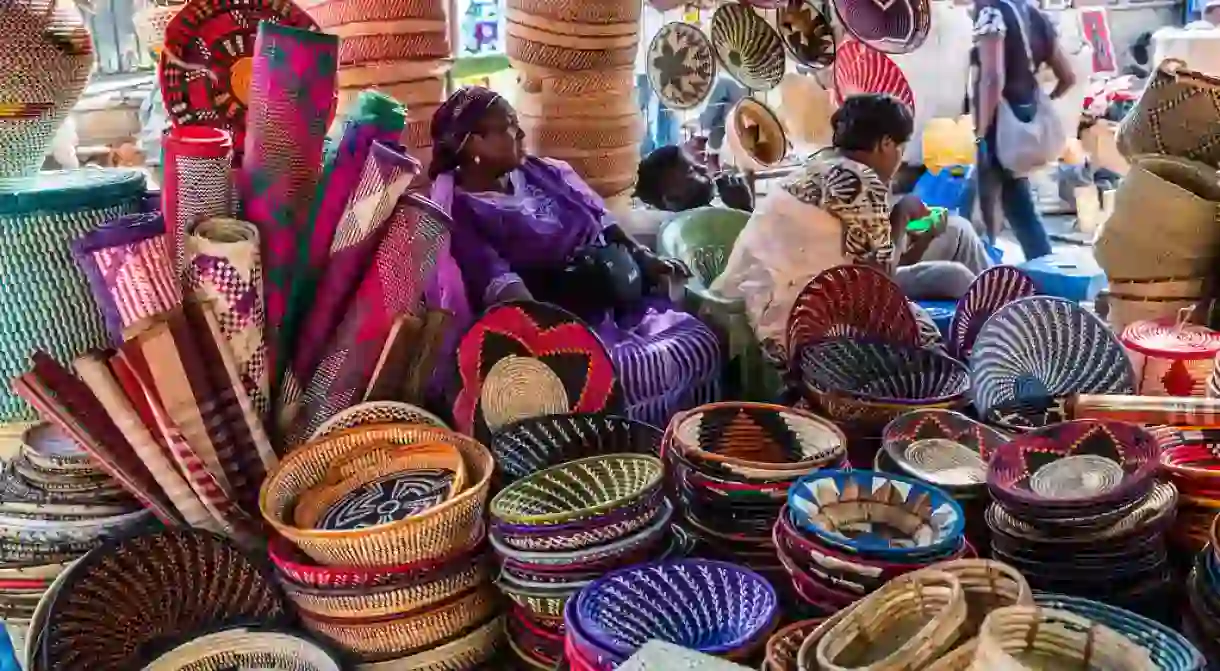A Gift Guide to Nairobi’s Maasai Markets

After spending time in Kenya, chances are that you’ll love it and want to take a little piece (or several) home to remember your adventures. Here is a guide of what to buy and how to best navigate Nairobi’s vibrant Maasai markets.
Maasai markets, like most others in Africa, are extremely lively spaces and can be a bit overwhelming for newcomers. Kenyans are very entrepreneurial and the artisans, who come from a variety of communities, naturally want your business. Expect to be called and coaxed with promises of the ‘best price’ or ‘best quality’. People will be eager to get you to their shop and offer to show you where to find things. Just walk with confidence, take your time and of course, have fun with the experience! You can learn a lot and meet many interesting and creative people on your shopping quest.

Bargaining & Language
Bargaining is part of the fun of a market experience. If you are not Kenyan, you will almost always be quoted a substantially higher price and should be prepared to bargain hard, but respectfully. Speaking some Swahili will help place you as someone who knows what you are talking about and who does not want to be ripped off.
Greeting someone with jambo will mark you as a tourist while using sasa or sema will make you appear more familiar with the Nairobi terrain. It is important to note that this can be seen as impolite towards a much older person however, so you should stick to asking how their day is going: ‘Habari za leo?’.
A few more useful phrases:
Si leo—‘Not today’—Use this if you are not even remotely interested in what someone has to offer.
Nitarudi—‘I will return’—This can be helpful if you are actually interested in something at someone’s stall, but either want to shop around more, or are hoping that they will come down on the price. It is always advisable to do a lap before purchasing. There will be a lot of similar products available but quality and prices will often differ, so shop around.
Ni ghali—‘It’s expensive!’—Feel free to really over-exaggerate this one for maximum bargaining leverage.
Bei ya mwisho—‘Last price’—Use this to announce your final offer.
Knowing some basic numbers to bargain in Swahili can also be a huge help, but don’t worry if you don’t master them all. The traders will be happy to let you know their prices, often with calculators in hand for some added drama.
Useful tip—Many artisans will be more likely to bargain either first thing when they open up to get a ‘first sale’ or in the evening just before closing up shop.
What To Buy
Maasai Sandals
Maasai leather and beaded sandals can be found in abundance at most of the markets and it is definitely worth picking up a pair or two. Try them on as sizes can differ between vendors. There will be a lot of choice, so take your time comparing designs across a few shops.

Jewelry
Most of the markets feature a good choice of jewelry, ranging from brass to beads, and you can find some really cool stuff. Many visitors buy bracelets beaded in the Kenyan national colors, which locals also wear. One thing to note is that many of the best artisans don’t bring their best-quality work with them to display for fear of competitors copying their designs. If you see someone who has nice products and have a bit of time to spare, it may be worth asking if they have other designs available.
Shukas
Maasai blanket or shukas, are a gift that most people will actually use so it is worth stocking up on some for your family and friends, and at least one or two for yourself. They are perfect to keep in your car, use as a picnic blanket or use as an extra layer in chilly weather.

Kiondos
These woven carryall bags come in both natural or colorful, striped varieties and are perfect to carry your day-to-day items. Prepare to be complimented frequently and for all your friends at home to ask why you didn’t bring them one!
Artwork & Carvings
You can find some interesting artwork and batiks within most markets, if you want something cool to hang on your wall but don’t want to spend a fortune. If your budget is a bit more flexible and you want something more unique, you can check out some of Nairobi’s art galleries—like those found at the Railway Museum or Kuona Trust—for some more variety. You’ll aslo find a decent range of wooden carvings, bowls, baskets and so on, to add a little Kenyan flair to your home.

The markets can be overwhelming but don’t let that get in the way of having fun while shopping. Remember to be patient and selective, so you don’t end up with 20 pairs of salad spoons that you and your loved ones really don’t need and won’t use. Focus on getting a few worthwhile pieces and enjoying the process of interacting with the artisans.
Market Schedule
Tuesday: Kijabe Street
Wednesday: Capital Centre
Thursday: Junction
Friday: Village Market
Saturday: High Court (CBD)
Sunday: Yaya Centre
* They are mainly open from around 8am to 6pm.













